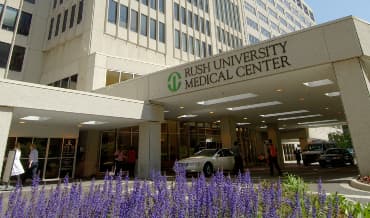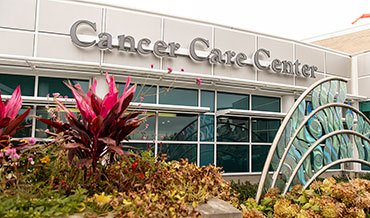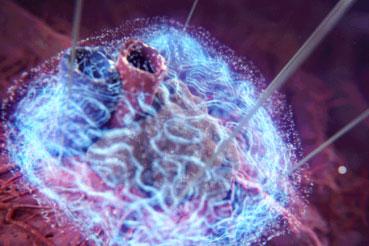The Rush Approach to Urologic Cancer Treatment
We understand that getting a urologic cancer diagnosis — including prostate, kidney, bladder and testicular cancers — can be overwhelming. When you come to Rush, you'll have a team of nationally recognized experts who take a compassionate, specialized approach to your care. We'll develop an individualized treatment plan for you that treats the cancer while preserving your urinary and sexual function as much as possible.
Treatment options for urologic cancers are constantly evolving and improving. And in the over 50 years that Rush has offered urologic cancer treatment in Chicago, our providers have actually pioneered many of these advances in imaging, genomics, radiology, targeted therapies, immunotherapies and minimally invasive urologic cancer surgeries.
Cancer Care at Rush

Second Opinion Services for Urologic Cancer at Rush
Any patient may request a second opinion on a urologic cancer diagnosis through our cancer center. While it is best to provide your previous results, we will work with you regardless of whether you have those results available. Through our cancer center, you’ll work with a coordinator who will guide you through the process from obtaining documents and records, facilitating your appointments, obtaining any testing you may need and answering any of your questions.
If you’d like a second opinion on your urologic cancer diagnosis, call Rush at (312) CANCER-1. You can also learn more from our Cancer Second Opinion Services page.
Rush Excellence in Urologic Cancer Treatment
- The most advanced diagnostic techniques: Getting the most effective care for urological cancers starts with getting an accurate diagnosis. Prostate cancer, in particular, can be difficult to detect with conventional imaging. Specialists at Rush University Medical Center in Chicago use breakthrough robot-assisted technology called image-guided targeted transperineal biopsy, which uses MRI to detect and sample prostate cancers right in your doctor's office. This minimally invasive procedure is not only more accurate, it's also far more comfortable for patients. The Medical Center is currently the only location in the U.S. that offers this technology.
- Treatment that protects healthy tissue: Rush University Medical Center in Chicago offers an in-office treatment called focal therapy, which uses thermal energy to destroy cancer cells without harming healthy areas. While this treatment is still being studied, it has the potential to be as effective as surgery and radiation therapy — with fewer aftereffects like incontinence or erectile dysfunction. The Medical Center is also the only hospital in the U.S. that is using irreversible electroporation (IRE), a targeted treatment for prostate cancer that destroys cancer cells with electric pulses.
- Expertise in minimally invasive urology cancer surgery: Our urologists are not only some of the best in Chicago, but also some of the country's leading laparoscopic and robotic surgeons. They bring many treatment options from their own areas of expertise, including active surveillance and image-guided biopsies and focal therapy for prostate cancer. Patients who undergo minimally invasive procedures with our urologic oncology surgeons typically have shorter hospital stays, less pain and faster recovery compared to traditional open surgeries.
- Preservation of urinary and sexual functions: Using tools like the da Vinci robot platform, nerve detection tools and cutting edge surgical techniques for prostate and kidney care, our urologic oncologists ensure that you have the best chance at preserving continence and sexual functions after treatment. They’ll also reduce the need to remove the kidney and maintain its ability to properly filter blood. For bladder cancer, our urologic oncology surgeons can use these same tools to actually create a new bladder in the pelvis that eliminates the need for ostomy.
- Access to clinical trials and personalized medicine: Urologic cancer specialists at Rush are known for pioneering treatment options and research for patients with prostate and other urologic cancers. Our team works closely with Tempus — a biotechnology company that analyzes your specific genetic and clinical data to provide information about how your cancer may respond to targeted treatments. This allows your care team to tailor your treatment to find the most effective option for your specific cancer.
- Follow-up care where — and when — you need it: Bladder, kidney, prostate and testicular cancers are conditions that require lifelong follow-up care. While we offer surgery for these conditions at Rush University Medical Center and Rush Copley Medical Center, you can get your follow-up care at a number of convenient locations in Chicago, Aurora/Fox Valley, Oak Park and Lisle.
FAQs About Urologic Cancer Treatment
There are several types of urologic cancers with different risk factors. The cause of kidney (renal) cancer is not known, but it is slightly more common in men than women. Bladder cancer is more common in men than women as well, and there is a genetic component, so a family history with the disease may indicate greater risk. It has also been linked to tobacco use and exposure to chemicals, dyes, paints and solvents. Urothelial cancer, which affects the lining of the tubes from the kidneys to the bladder, is another cancer linked to genetics. Some cancers are only a risk for people who have the affected organs, including prostate cancer, penile cancer and testicular cancer.
Additionally, prostate cancer has genetic risk factors. The causes of testicular and penile cancer are not known; although, human papilloma virus, or HPV, infection may increase your risk of penile cancer.
Usual symptoms of urologic cancers are pain and blood in the urine. In the case of testicular cancer, you may also feel a palpable mass or lump on the testicle. However, most urologic cancers are found through medical screenings, often by “accident” through testing for other medical issues.
Urologic cancers are often discovered incidentally through imaging tests, like CT scans, for other medical issues. Some of the other methods of diagnosis include screening blood tests, a cystoscopy procedure that uses a small camera through the urethra to look at the bladder or a biopsy that involves removing some of the affected tissue to examine in a lab.
Treatment depends on the type of urologic cancer and how aggressive or extensive it is. In some cases, cancers that are indolent, or very slow-growing, can be monitored without the need for further immediate treatment. In other cases, initial treatment such as polypectomy can cure the cancer. When more extensive treatment is needed, surgery can treat the cancer, or it can be used with radiation or androgen deprivation therapy. Chemotherapy and immunotherapy can also provide systemic treatment when appropriate.
For kidney cancer, a surgeon may remove the tumor, or they may remove the entire organ depending on the size and characteristics of the tumor. A physician may treat kidney cancer with radiofrequency ablation (RFA), which uses heat, or cryotherapy, which freezes the tumor. For prostate cancer, an oncologist may recommend completely removing the prostate, or they may use high intensity focused ultrasound to heat the tumor or cryotherapy to freeze it. For bladder cancer, a surgeon may remove the bladder and reconstruct it. Because treatments vary so much for each specific case, it is best to consult with your oncologist on the best options available to you.
Recovery time varies from patient to patient and often depends on the type of surgery performed. Transurethral resection or polypectomy are fairly minor procedures, and the patient may recover within a day. For patients who undergo full prostate removal or removal of part or all of the kidney, they may have a catheter for a week and take about 2 to 4 weeks to recover. For bladder removal, even with minimally invasive techniques, patients may need to spend 3 to 5 days in the hospital and not fully recover for another 3 to 5 weeks. Again, because treatment can vary so much, it’s best to ask your oncologist about what you can expect for recovery time.











